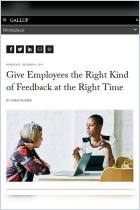Imagine that all your life, unbeknownst to you, you’ve been making an embarrassing error. Ideally, someone sets you straight, preventing you from making the same misstep going forward. Alas, most people hesitate to extend constructive feedback. Research from Nicole Abi-Esber and Juliana Schroeder, published in the Journal of Personality and Social Psychology, finds evidence of a significant “feedback gap”: People often withhold feedback, even when the recipient welcomes it. Learn how to gauge whether others are open to feedback, and why hesitating to give feedback isn’t always the best move.
People often mistakenly assume that others don’t want constructive feedback.
Sometimes you would benefit from constructive feedback – say, when you mispronounce a word or have a smudge of chocolate on your face – yet others fail to give it to you. Research shows that people avoid giving others useful feedback for two reasons: They don’t want to be “the bearer of bad news,” and they don’t want to embarrass others or hurt their feelings.
Researchers Nicole Abi-Esber and Juliana Schroeder studied why people hesitate to give constructive feedback, publishing their insights in the Journal of Personality and Social Psychology. The researchers found that across multiple contexts – including formal and informal situations, between close friends and among strangers, and in trivial and serious matters – people underestimate others’ desire for feedback.
A significant “feedback gap” exists because people underestimate others’ desire for constructive feedback.
To better understand...
Nicole Abi-Esber is a Harvard Business School doctoral candidate, and an incoming assistant professor of organizational behavior with the London School of Economics management department. Juliana Schroeder is an associate professor at the Berkeley Haas School of Business.























Comment on this summary or Comenzar discusión